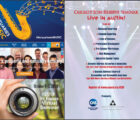
In March 2014, the CAS renamed its Academic Correspondent Program to CAS Academic Central and announced several changes to the program that demonstrate its commitment to supporting the academic community. CAS staffer Tamar Gertner discussed the new initiative with the CAS member who championed the changes, Rick Gorvett.
I’ve had a lot of interaction with you because you’re a super-active volunteer. It’s hard to believe sometimes that you have a “day job!”
I’m the director of the actuarial science program at the University of Illinois at Urbana-Champaign. One great thing about a university faculty position is that academia does value national and international activities that serve to enhance and expand an area of interest, such as the actuarial profession and the CAS. Since becoming a member of the CAS “mumbledy-mumble” years ago, I’ve had the great fortune to participate on numerous committees and task forces with important and worthwhile goals. One current example of a topic very close to my heart is the University Engagement Committee (UEC), being very ably and effectively chaired by Wes Griffiths. I chair one of the four sub-units of the UEC, the Academic Working Group. I’m also in the second year of a three-year term on the CAS Board of Directors, for which engagement and relationships with academia is a huge area of interest.
What do you think of the recent university engagement efforts made by the CAS?
The CAS has had formal programs in place to support academics and students since the early 1990s through the Academic Correspondent and University Liaisons Programs. However, those efforts were sometimes inconsistent, and probably inadequate relative to the new professional landscape in which we find ourselves competing for talent more frequently, both within and outside the traditional actuarial profession. Over the last couple of years, the CAS has begun making tremendous strides in its university outreach and support. This increasing level of engagement, with both university students and faculty, will be critical going forward, from many perspectives: marketing the CAS and the casualty actuarial profession to university students; providing advice and resources to universities and faculty for training students, to help ensure a pipeline of talent with appropriate skills for evolving and emerging actuarial jobs; and connecting with faculty on mutually beneficial research projects.
What was the “Academic Correspondent Program” and why was it created?
It was created to provide nonmember academics teaching actuarial science, mathematics, economics, business, and related courses, with an opportunity to be affiliated with the CAS and gain access to the Society’s resources. Academic member benefits have included access to CAS publications, complimentary CAS exam study kits, and invitations to attend some CAS meetings or seminars with the registration fee waived.
What prompted the CAS to reexamine the program and retool it as CAS Academic Central?
In the fall of 2013, the UEC administered a survey to many academics involved in teaching actuarial students; 100 responses were received. The responses provided valuable and surprising insights. Particularly eye-opening was that more than two-thirds of academic respondents did not know that the Academic Correspondent Program existed. However, 87 percent of respondents were interested in joining the program—with a strong suggestion that membership be free. The survey results prompted the UEC to recommend specific actions to renovate the Academic Correspondent Program. One key recommendation was to discontinue the $75 annual fee for academics to join the program, and this recommendation was unanimously approved by the CAS Board. Other recommendations involved expanding the panel of benefits provided to program members, and to modernize, rebrand, and aggressively market the program.
How then is CAS Academic Central different than the program under the previous name (notice I’m trying to get it out of my vocabulary)?
We started with the name. Since CAS Student Central had recently gone online as a community and resource for university students, we felt the parallel title of CAS Academic Central for a similar resource and community for faculty was both appropriate and irresistible.
As mentioned, we have eliminated the fee to join the program. We have also streamlined the membership registration process. New benefits for members include access to complimentary webinars and to content within the University of CAS. But most noteworthy is that academic members now have their own online community, featuring monthly blogs, a resource library, a calendar of key events and deadlines, and a discussion forum. The online community provides a place for academics to share ideas and best practices, post questions and connect with one another.
What would you say to fellow academics to encourage them to join the program?
Historically, most academics with a connection to actuarial science have had backgrounds on the life side. And yet, when speaking with these academic colleagues at conferences, my experience has been that they are surprised by how interested and intrigued they are by property-casualty topics and issues when they are exposed to them. They are also increasingly aware that the casualty actuarial profession is a viable and attractive career opportunity for their students. So I think an appeal to my fellow academics to join CAS Academic Central on the basis of either (or both) teaching and research/scholarship can and will be effective.
What other initiatives related to CAS support of the academic community are being considered by the Academic Working Group?
We are completing a curriculum guide that describes each of 15 or 20 skills important for students preparing for casualty actuarial careers; this guide will soon be available on CAS Student Central. We are preparing a guide that can be used by faculty and by CAS University Liaisons, to help schools consider and implement topics of relevance to casualty actuarial science into their curricula and courses. Finally, we are examining ways to enhance the scholarly link with academics, possibly through research relationships, calls for papers directed toward academics, research project challenges for student-faculty teams, and so forth. No idea is off the table if it has the potential to mutually enhance the CAS-university relationship!
Do you have any closing thoughts you’d like to share?
The speed and effectiveness of recent CAS efforts to enhance our engagement with both university students and faculty exemplifies the best of our Society: a ground-up approach to developing a program or capability, spearheaded by numerous free-thinking and dedicated volunteers, and facilitated by an excellent staff. Regarding the CAS staff, you, Tamar, and Mike Boa have provided exceptional guidance, insights and hard work. My compliments and appreciation!
Thank you, Dr. Gorvett! I appreciate your time!
My pleasure. Thank you!
Academics interested in signing up as members of CAS Academic Central can do so at www.casact.org. Please feel free to contact Tamar Gertner with questions at tgertner@casact.org.











